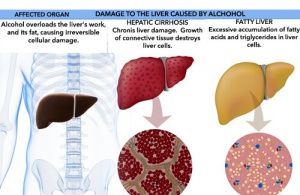The Effects of Alcohol in the Body

Alcohol produces innumerable harmful effects in the body. In this case, the amount of alcohol you drink plays a very important role, as well as the circumstances.
If you drink alcohol with a full stomach, its effects on your body will be weaker. On the other hand, if you drink alcohol on an empty stomach, it has much greater effects.
How does alcohol act in the body?
Alcohol can have a double effect on the body. At first it produces a great sense of satisfaction and happiness, but then it begins to cause blurry vision and serious coordination problems.
The cellular membranes cannot stop the alcohol from moving in. Once in the blood, it irrigates through the majority of tissues that comprise the body.
With excessive consumption, you can easily lose your consciousness. But extremely high consumption can cause alcohol poisoning and even death.
A high alcohol blood content causes cardiorespiratory arrest; or it can cause death by asphyxiation in your own vomit. When someone is completely “gone” due to alcohol consumption, they can drown in their own vomit by not being able to respond to this need.
After consumption, alcohol can take up to 30 or 90 minutes to reach the blood. Once that happens, your blood sugar drops, causing complete weakness and exhaustion. This is because alcohol accelerates the transformation of glycogen into glucose, which your body quickly eliminates.
The phases of alcohol intoxication
Effects appear immediately after drinking. They depend on how much alcohol you ingested.
- The first phase is euphoria, excitation, lack of inhibitions, and impulsive behavior.
- The second phase is intoxication. When your body is not used to alcohol and it affects the nervous system, you lose the ability to coordinate movements. Since you also lose your balance, you may fall a lot. Alcohol also causes depression and temperature drops in the body.
- The third phase is hypnosis, confusion, irritability, agitation, sleepiness, nausea, vomiting, and headaches.
- The fourth stage is anesthetic and stupor. The drinker says incoherent words, consciousness is noticeably diminished and muscular strength is lost. They can no longer control the urge to urinate and breathing becomes difficult.
- The fifth phase is an alcoholic shock. They enter into cardiovascular shock, which causes respiratory arrest and death.
The effects of alcohol consumption on the body
A lot of alcohol’s effects on the body take place over short and long-term basis. They also affect a lot of organs.
The effects of alcohol in the brain and nervous system
- Frequent alcohol consumption seriously affects brain function. In the first place, it affects your emotions, causing sudden changes in your mood. Your mobility control can also become affected, causing poor pronunciation, slow reactions, and loss of balance.
- It can also affect neurotransmitter actions by modifying their structure and function. This produces a series of effects like a slower ability to react to stimuli and low reflexes. You can lose the ability to coordinate movements, or even suffer from shaking and hallucinations.
- You lose self-control, memory, the ability to concentrate and motor functions.
- All of these effects together cause a large amount of work and traffic accidents. And those accidents have ended the lives of a considerable amount of people around the world.
- Alcohol causes serious damage to the brain cells, along with the peripheral nerves. Furthermore, this damage can be permanent.
- Alcohol also causes vitamin B1 loss, which causes Wernicke-Korsakoff syndrome. It’s a diseases that provokes changes in your feelings, thoughts, and memory.
- It creates sleep disorders in a large majority of people that frequently consume alcohol.
- These people also frequently become isolated from their social, work, and family lives, which causes family abandonment, divorces, and job loss. This can cause end up causing severe depression, and even suicide. A large part of these effects depend on the quantity and frequency in which the person drinks.
- In very high doses, it can produce comas. In very advanced cases, it can also cause very serious mental changes, and permanent brain damage.
- It can create periods of anemia, with changes in memory condition. Those periods can last from minutes, to hours, or even days.
Read also:
In the heart and respiratory system
- It increases cardiac activity.
- Consumption in very high doses can increase blood pressure, creating cardiac muscle damage due to the toxic effect of alcohol.
- It weakens the cardiac muscle and its ability to pump blood.
- Produces peripheral vasodilation, which causes redness in the skin, and an increase of superficial skin temperature.
In the digestive tract: stomach, pancreas, liver, and esophagus
All of this gastric discomfort is due to the fact that ethanol erodes and irritates the gastric mucosa, causing stomach burning. The effect can be much worse if you drink different types of liquor at the same time.
- Alcohol increases gastric acid production, causing irritation and inflammation in the stomach walls. This can lead to ulcers and internal hemorrhages, which can be fatal.
- High alcohol consumption can cause stomach, larynx, esophagus, and pancreas cancer.
- It can cause esophagitis, or inflammation of the esophagus, as well as bleeding esophageal varicose veins.
- Causes acute pancreatitis, which is severe inflammation of the pancreas. This can cause death.
- Pancreatitis can also be chronic and cause intense, permanent pain.
- Alcohol consumption can cause the drinker to suffer from type II diabetes, with the severe consequences that this disease entails.
- The liver is the organ in charge of metabolizing alcohol. Liver enzymes transform the alcohol first into acetaldehyde, and then into acetate, and other compounds. This process is very slow, and therefore, causes damage to the liver tissues.
- Due to liver irritation and cellular inflammation, you could be likely to develop alcoholic hepatitis. You could get fatty liver disease, and it can then develop into hepatitis, and later, cirrhosis. This could also end up producing liver cancer, which could end up in death.
- Other changes in this organ could include jaundice, or a yellow coloring to the skin, sclera, and fluid accumulation in the extremities.
- Kidney function is altered as the anti-diuretic hormone levels decrease, which causes dehydration.
- Alcohol provides a large amount of calories with very little nutritive value. It impedes the absorption of some vitamins and minerals and eliminates appetite, causing malnutrition.
Read also:
The effects of alcohol in the blood
- It impedes the productions of white and red blood cells.
- Megaloblastic anemia happens when there are not enough red blood cells to transport oxygen.
The effects of alcohol in the immune and reproductive systems
- The lack of white blood cells produces immune system failure, which increases your risk of acquired bacterial or viral infections.
- Reduces sex drive.
- Can cause infertility or erectile dysfunction.
In pregnancy and the fetus
- Consuming alcohol during pregnancy can cause fetal alcohol syndrome in the fetus. Symptoms of this condition manifest as growth retardation, changes in craniofacial traits, cardiac deformations, liver, kidney, and ocular deformations.
- The most severe damage happens in the fetus’s central nervous system, as a marked mental development retardation.
Alcohol dependency syndrome or alcoholism

This is one of the most severe problems brought by drinking without limits, or uncontrollably. There are large amounts of symptoms and diseases associated with alcoholism.
We hope that this illustration of all the serious problems that alcohol can create is a true help to become aware of the dangers. We also hope it pushes you to get professional help.
Alcoholism is more than just a “vice”, as some people call it. It’s a serious health problem that should receive immediate attention as soon as you begin to feel the desire to drink frequently.
If you have a friend, family member, or someone you know, that has this problem, try to help them quit. Help them find a rehabilitation center for alcoholics.
We can assure you that later on, they will thank you. You’ll save them from numerous problems, both with family and personally. And most importantly, they’ll avoid the serious health consequences that can frequently be fatal.
This text is provided for informational purposes only and does not replace consultation with a professional. If in doubt, consult your specialist.








